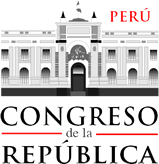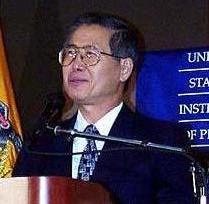Related Research Articles

The politics of the Republic of Peru takes place in a framework of a unitary semi-presidential representative democratic republic, whereby the President of Peru is both head of state and head of government, and of a pluriform multi-party system. Executive power is exercised by the President and the Government. Legislative power is vested in both the Government and the Congress. The Judiciary is independent of the executive and the legislature. The Economist Intelligence Unit rated Peru a "hybrid regime" in 2022. Traditionally weak political parties saw their support collapse further in Peru since 2000, paving the way for the rise of personalist leaderships. The political parties in the congress of Peru are, according to political scientist Lucía Dammert, "agglomerations of individual and group interests more than solid and representative parties".

Alberto Kenya Fujimori Inomoto is a Peruvian former politician, professor and engineer who served as President of Peru from 28 July 1990 until 22 November 2000, though de facto leadership was reportedly held by Vladimiro Montesinos, the then head of the National Intelligence Service. Frequently described as a dictator, he remains a controversial figure in Peruvian politics. He is currently in prison, serving a 25-year sentence for human rights abuses during his presidency.

Vladimiro Lenin Ilich Montesinos Torres is a Peruvian former intelligence officer who was the long-standing head of Peru's National Intelligence Service (SIN) and was reportedly the de facto leader of Peru while President Alberto Fujimori served as a figurehead leader. Montesinos had strong connections with the U.S. Central Intelligence Agency (CIA) for over 25 years and was said to have received $10 million from the agency for his government's anti-terrorist activities, with international bank accounts possessed by Montesinos reportedly holding at least $270 million. The United States reportedly supported the candidacy of Fujimori during 1990 Peruvian general election due to his links to Montesinos and ignored human rights abuses performed under Montesinos during the 1990s. In 2000, the infamous "Vladi-videos" came to light when they were broadcast on the news. They were secret videos recorded by Montesinos that showed him bribing elected congressmen into leaving the opposition and joining the pro-Fujimori group of the Congress. The ensuing scandal caused Montesinos to flee the country and prompted Fujimori's resignation.

The president of Peru, officially called the Constitutional President of the Republic of Peru, is the head of state and head of government of Peru. The president is the head of the executive branch and is the Supreme Head of the Armed Forces and National Police of Peru. The office of president corresponds to the highest magistracy in the country, making the president the highest-ranking public official in Peru.

Valentín Toribio Demetrio Agustin Paniagua Corazao was a Peruvian lawyer and politician who briefly served as President of Peru from 2000 to 2001. Elected President of Congress on 16 November 2000, he ascended to the presidency as incumbent Alberto Fujimori and both his Vice Presidents resigned by 22 November 2000.
The judicial system of Ukraine is outlined in the 1996 Constitution of Ukraine. Before this there was no notion of judicial review nor any Supreme court since 1991's Ukrainian independence when it started being slowly restructured.

The Barrios Altos massacre occurred on 3 November 1991 in the Barrios Altos neighborhood of Lima, Peru. Members of Grupo Colina, a death squad comprising Peruvian Armed Forces personnel, were later identified as the assailants who killed fifteen individuals, including an eight-year-old child, and injured four others. The victims were reportedly partygoers associated with the Marxist-Leninist-Maoist group Shining Path. Nevertheless, judicial authorities found that they were not terrorists.


A self-coup, sometimes known as the Fujimorazo, was performed in Peru in 1992 after President Alberto Fujimori dissolved the Congress as well as the judiciary and assumed full legislative and judicial powers. With the collaboration of the military, the Fujimori government subsequently began to implement objectives of the Green Plan following the coup.

Martha Gladys Chávez Cossío de Ocampo is a Peruvian Fujimorist politician and lawyer. A historical and a prominent figure of Fujimorism, she has served in Congress for six-non consecutive terms from 1995 to 2006 and from 2011 to 2016, and since 2020 to finish the 2016–2021 that was interrupted by the dissolution of Congress. In the 2006 elections, she ran for the presidency, running on the Fujimorist Alliance for the Future ticket, but she lost, placing fourth in the election.
Anti-terrorism legislation are laws with the purpose of fighting terrorism. They usually, if not always, follow specific bombings or assassinations. Anti-terrorism legislation usually includes specific amendments allowing the state to bypass its own legislation when fighting terrorism-related crimes, under alleged grounds of necessity.

Former Peruvian President Alberto Fujimori was arrested, tried, and convicted for a number of crimes related to corruption and human rights abuses that occurred during his government. Fujimori was president from 1990 to 2000. His presidency ended when he fled the country in the midst of a scandal involving corruption and human rights violations.
Decree Law 25418 is a highly controversial Peruvian law decreed in April 1992 by then-President Alberto Fujimori. The decree essentially provided the legal trappings for the coup d'état of April 5, 1992.

Fujimorism denotes the policies and the political ideology of former President of Peru Alberto Fujimori as well as the personality cult built around him, his policies and his family, especially Keiko Fujimori. The ideology is defined by authoritarianism, its support for neoliberal economics, opposition to communism, and socially and culturally conservative stances such as opposition to LGBT rights and school curriculums including gender equality or sex education. Opponents of Fujimorism are known as anti-Fujimorists.

The judiciary of Saudi Arabia is a branch of the government of Saudi Arabia that interprets and applies the laws of Saudi Arabia. The legal system is based on the Islamic code of Sharia, with its judges and lawyers forming part of the country's religious leadership or ulama. There are also non-Sharia government tribunals which handle disputes relating to specific royal decrees. Final appeal from both Sharia courts and government tribunals is to the King of Saudi Arabia and all courts and tribunals follow Sharia rules of evidence and procedure.

Martín Alberto Vizcarra Cornejo is a Peruvian engineer and politician who served as President of Peru from 2018 to 2020. Vizcarra previously served as Governor of the Department of Moquegua (2011–2014), First Vice President of Peru (2016–2018), Minister of Transport and Communications of Peru (2016–2017), and Ambassador of Peru to Canada (2017–2018), with the latter three during the presidency of Pedro Pablo Kuczynski.

A constitutional referendum was held in Peru on 9 December 2018 alongside the second round of gubernatorial elections.

Since 2016, Peru has been plagued with political instability and a growing crisis, initially between the President, Pedro Pablo Kuczynski and Congress, led de facto by Keiko Fujimori. The crisis emerged in late 2016 and early 2017 as the polarization of Peruvian politics increased, as well as a growing schism between the executive and legislative branches of government. Fujimori and her Fujimorist supporters would use their control of Congress to obstruct the executive branch of successive governments, resulting with a period of political instability in Peru.

The 2019–2020 Peruvian constitutional crisis began when President Martín Vizcarra dissolved the Congress of Peru on 30 September 2019 considering a de facto denial of the vote of confidence. The majority of lawmakers, opponents and Fujimorists viewed Vizcarra's actions as a "coup" or "self-coup" while some compared the event to the 1992 Peruvian self-coup. Congress responded by declaring Vizcarra's presidency suspended and appointed Vice President Mercedes Aráoz as interim president. During the evening hours, the heads of the Peruvian Armed Forces shared a photograph beside Vizcarra in the Government Palace amidst the crisis, putting forward their support for him.

Alberto Fujimori served as President of Peru from 28 July 1990 to 17 November 2000. A controversial figure, Fujimori has been credited with the creation of Fujimorism, defeating the Shining Path insurgency in Peru and restoring its macroeconomic stability. However, he was criticized for his authoritarian way of ruling the country and was accused of human rights violations. Even amid his prosecution in 2008 for crimes against humanity relating to his presidency, two-thirds of Peruvians polled voiced approval for his leadership in that period.
References
- 1 2 3 4 5 "Peru: Judicial Reforms". Oxford Analytica Daily Brief Service. 24 June 1996. p. 1. ProQuest 192422243.
- 1 2 "Alberto Fujimoris Reforms in Peru".
- 1 2 3 "The Coup against the Courts: Terrorist and Judicial Housecleaning". United States Embassy in Peru. Retrieved 27 April 2013.
- ↑ Smith, Peter (1995). Latin America in Comparative Perspective. p. 234.
- ↑ Carrion, Julio (2006). The Fujimori Legacy: The Rise of Electoral Authoritarianism in Peru. p. 129.